
The crime of Treason
Graham Hillard
In a particularly irritating scene in the new limited series Treason, the protagonist, Adam Lawrence, is sitting at home when a foreign agent telephones to demand a meeting. Played by the 40-year-old Charlie Cox (Daredevil), Adam has recently been made head of MI6 despite possessing the sort of waggish good looks that ought to have set up a dozen security-related red flags. Mere seconds later, we see the spy chief arriving at a deserted alley, ready to trade away British secrets. How has he shaken his protection detail, the omnipresence of which has been repeatedly demonstrated? Beats me. Clearly, the viewer is not meant to ask such pesky questions.
Shortcuts of this kind abound on Netflix’s latest, a series that plainly means to offer narrative momentum in place of coherence, character development, or smart writing. Such a formula, perfected by Fox’s 24 more than two decades ago, can work well enough if a production is compellingly cast. Alas, Treason has no answer to Kiefer Sutherland nor to the supporting players who endured his barking and gave back some of their own. To watch Netflix’s insipid spies is like watching a team of game show hosts perform open-heart surgery. They may look terrific under the lights, but one is loath to trust them with the scalpel.
Treason begins in that most British of institutions, the private club, where Adam’s predecessor, Sir Martin Angelis (Ciaran Hinds), is preparing to blackmail a judge. A figure in the J. Edgar Hoover vein, Sir Martin keeps a file on every man and woman in the Whitehall establishment, the better to extort illicit favors. Use a government plane for personal errands? Sir Martin knows. Have an extramarital affair? Gird your loins, sinner. Is it any wonder that, like James Bond in Casino Royale, the veteran snoop soon finds himself on the receiving end of a poisoned cocktail?
The assassin in question, known only by the mononym Kara (Olga Kurylenko), is both Treason’s most complicated character and a symptom of the show’s general unintelligibility. A shadowy Russian with a murderous grudge, Kara moves through London with mathematical precision, disposing not only of Sir Martin but of the bumbling driver who threatens her getaway. Simultaneously, she is Adam’s scorned lover, a broken operative bearing the scars of previous fieldwork gone wrong. A better show might have made something fascinating out of this split persona, creating in Kara a living embodiment of spycraft’s soul-warping contradictions. Treason, however, is merely confusing. Having absconded with Adam’s daughter in one episode, she gives him an affectionate kiss in another. Some viewers may differ, but I prefer my black widows without a golden retriever’s wagging tail.
It is surely no coincidence that “Kara” is a mere letter away from “Karla,” the fictional KGB boss dreamed up by John le Carré in 1974’s Tinker Tailor Soldier Spy. Unlike le Carré’s portrayal of spies as pudgy plodders, good for a low-tech con or two but hardly on the cutting edge of sophistication, Treason’s characters are fashion models uttering one-liners at the helm of a panopticon. The consequence is a spy series that has all but eliminated human error as a source of drama. What remains are endlessly shifting allegiances, and too many of those result in television that is insubstantial, impenetrable, and dull.
This is not to say, of course, that Treason’s attitude toward official Britain is an optimistic one. Indeed, the show’s politics are, if anything, even more cynical than le Carré’s at his most anti-Western and grim. [Ed.: About which read more in this section’s book review, “The guarded John le Carre.”] Take, for instance, an important subplot in which a Tory leadership race pits the cosmopolitan foreign secretary (Alex Kingston) against an MP with unseemly Russian ties (Simon Lenagan). So cartoonish is the treatment of the latter that I half expected him to make reference to Hunter Biden’s laptop or pronounce the capital of Ukraine “key-ev.” One might suppose that the intelligence apparatus would favor the foreign secretary in such a matchup, given the obvious national security implications. Yet, counterintuitively, the opposite is true. Allowing a Russophile to occupy 10 Downing Street will “remind people why they need a strong MI6,” one spy confesses to another.
Treason feels like a network drama that has stumbled inadvertently onto premium TV. As subtle as a hit list, the series exists to remind us bumpkins that our superiors are both all-seeing and corrupt. Within this vision, it will surprise no one to learn Americans are even less to be trusted than Brits. Manipulating events throughout the show’s run is the unscrupulous CIA officer Dede Alexander (Tracy Ifeachor), who served in Afghanistan with Adam’s wife, Maddy (Oona Chaplin). As in the Kara subplot, any hint of complexity here is buried beneath a mountain of bad writing and one-dimensional characterization. Should Maddy betray her husband to the woman who once saved her life on the battlefield? No. Dede is simply too unpleasant to deserve the help.
As for Cox’s performance in the lead, it is regrettable in the way of all miscastings and positively shimmers with implausibility. Give the man a bald spot, a proper shave, and a few dozen years. Only then will he be a spy worth following.
Graham Hillard is the author of Wolf Intervals (Poiema Poetry Series) and a Washington Examiner magazine contributing writer.
